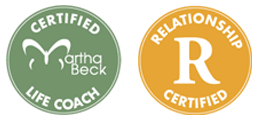 A 2009 article in O magazine reported on a study conducted at Stanford with over 1500 participants, looking at what differentiated partners in happy, healthy relationships from people who were disappointed and unhappy. The only indicator that had an impact on long-term satisfaction: blaming your partner for problems in the relationship!
A 2009 article in O magazine reported on a study conducted at Stanford with over 1500 participants, looking at what differentiated partners in happy, healthy relationships from people who were disappointed and unhappy. The only indicator that had an impact on long-term satisfaction: blaming your partner for problems in the relationship!
Being responsible for ourselves and our behaviors is at the root of maturity. But that requires being in our “adult self”. As I’ve mentioned in prior articles, sometimes we can easily shift into our “child self” when we are triggered. And being told you are wrong, or the perception that you are being told you are wrong, often triggers strong emotions, especially shame.
So here’s how it might look:
Sally and Bill are having a disagreement. Both of them have internal “Love Stories” from their early experiences of being shamed by a critical parent. Bill’s is “I am a failure” and Sally’s is “I am not valued”. Sally is angry that Bill spent $150 to play golf while they are struggling financially. Rather than listening respectfully to each other’s positions, each of them jumped into blaming the other and defending their own position.
Bill said, “If you didn’t nag me so much about the bills, I wouldn’t need to get outdoors and relieve my stress!”
Sally said, “If you spent more time looking for a better job, we wouldn’t be in this mess!”
The more each of them felt attacked, the more that “I am a failure” and “I am not valued” place got triggered. And once Sally or Bill went into their “child self”, they reacted from that overly emotional, wounded, irrational place. Had each one known how to move into their “adult self”, they each could have looked at what part each one was responsible for. The problem is when we confuse BEING RESPONSIBLE with BEING WRONG. Each of them thought that to admit responsibility for their part would feel like defeat, since they had frequently been blamed and made wrong as children.
You (or Sally or Bill or anyone) cannot navigate conflict in a health way in any of your relationships if you do not take responsibility for the part you are creating.
“Whenever we blame others for the current circumstances in our lives, we
abdicate responsibility for our choices and we reinforce our own impotence.
We construct an either/or world – either I am right (and someone else is wrong),
or I am wrong (and therefore, deeply shamed).”
-Katherine Woodward Thomas, Calling in the One
So you end up stuck in your “child self” and powerless. When you learn to lead from your adult self, you know that it feels good to take responsibility for yourself and stop being a victim. You create relationships based on love where it is safe to admit one’s mistakes without fear of retribution. You create relationships where you allow your partner to feel safe to admit their faults without being judged. In this atmosphere, love thrives.
Sometimes in order to do this we have to let go of the concept of “fair”. I’ve always remembered a quote I heard back in 1988 from Los Angeles radio psychologist Dr. Toni Grant, “Do you want to be right or do you want to be loved?”



